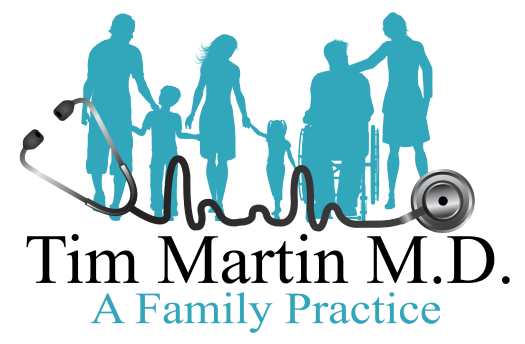Dr. Tim Martin shares his perspective on health topics from his years of experience as a primary care physician and wellness champion.
Better Sleep, Better Health: Your Daily Checklist
In our fast-paced, overly connected, achievement-based culture, sleep is often seen as a necessary evil. But sleep is essential to your physical health, your emotional well-being, and your ability to maintain a busy schedule and achieve your goals.
Sleep restores your body and mind to help them function optimally during your waking hours. Skimping on sleep makes you feel sluggish, dulls your brain’s processing and memory capabilities, impairs your immunity, and can lead to weight gain and other issues.
Here’s a daily checklist to help you catch more Z’s and get the most out of your sleep.
Preparation
–Hello, Sunshine: A study found that two hours of exposure to bright light during the day enhances the amount and effectiveness of sleep in adults. Add time in the sun to your day by eating a meal on the patio, walking your dog, and taking frequent stretch breaks outside.
–Set the Stage: Do you have a quality mattress, breathable sheets, season-appropriate blankets, and a supportive pillow? Having a comfortable bed is key. It’s worth investing in these items that you will use on average more than 2,500 hours in a year.
–Quiet the Mind: It’s not realistic to be going 100 miles an hour until bedtime and then expect to fall asleep the moment your head hits the pillow.
-Turn off devices 30 minutes to two hours prior to bedtime. The blue light emitted from laptops, TVs, phones and backlit e-readers stimulates the brain into thinking it is still daytime and will interfere with sleep.
-Do some simple, non-strenuous yoga stretches or breathing exercises.
-Use one of the many sleep apps with soothing music or meditations.
-Take a bath as you prepare for bed. Warm water is a natural relaxant. Add Epsom salts or a few drops of lavender oil to the water.
Environment
–Dark, Quiet, Cool: A dark, cool, quiet room is the ideal environment for quality sleep. Adjust these factors to suit your personal preferences.
-Like it dark? Turn off lights, cover any digital lights on clocks or TVs, hang light-blocking shades. Need just a little light? Use a small nightlight in the bathroom or in the hall outside your room.
-Need to muffle highway noise or loud family members? Use a white noise machine, a white noise app or even the bathroom fan.
-If you like your room cold, turn your air conditioner or heater down low. With frequent cycles the AC can also double for white noise.
–Clean Room, Clear Mind: Before bed, take a few minutes to pick up dirty clothes off the bedroom floor, clear off the nightstand, and stash clutter in the closet. Studies show a decluttered room creates mental space for relaxation.
Consistency
–Bedtime is Not Just for Kids: While challenging to practice, it’s worth the effort to maintain a consistent bedtime, even on weekends. To train your circadian rhythm—or your body’s sleep/awake cycle–the same goes for your wake-up time.
–Nip the Naps: Avoid taking naps longer than 30 minutes and do not nap late in the day. Getting too much sleep at the wrong time minimizes your body’s natural sleep drive, and this could lead to you staring at the ceiling at your regular bedtime.
Coffee, Cocktails, and Capsules
-To Drink or Not to Drink: Have your coffee and cola (in moderation) early in the day. Caffeinated beverages may give you the pep in your step to get through the workday. But an after-dinner cappuccino may have you counting sheep at midnight.
-Wine Could Leave You Whining: Drinking alcohol disrupts your circadian rhythm and makes you more prone to wake in the middle of the night. These interruptions decrease sleep’s restorative effects.
-Remedy the Situation: Many supplements are available over the counter to help enhance sleep, such as ginkgo Biloba, valerian root, magnesium, and glycine. By far, the most popular sleep supplement is melatonin, which is a naturally occurring hormone that tells your body it’s time to sleep. Take one to five mg of melatonin about 30 to 60 minutes before bed. Talk to your health care provider before taking a new supplement.
Sleep for the Win
Now you know how to maximize the quality of your sleep as it is vital for promoting healing, lifting depression and sharpening the mind. To get these benefits, however, you also need the right amount of sleep. According to the National Sleep Foundation, adults need between 7 and 9 hours of sleep per night. Babies, children and teens need more sleep as they are continuing to grow and develop.
Nutrition and exercise get most of the attention when it comes to healthy living. By paying more attention to your sleep routine, you’ll get more mileage out of your other healthy habits and position yourself for lifelong health.
Sweet dreams!
Sources:
https://www.healthline.com/nutrition/17-tips-to-sleep-better
https://www.helpguide.org/articles/sleep/getting-better-sleep.htm
https://www.sleepfoundation.org/sleep-hygiene/healthy-sleep-tips
https://www.headspace.com/sleep/how-to-sleep-better
